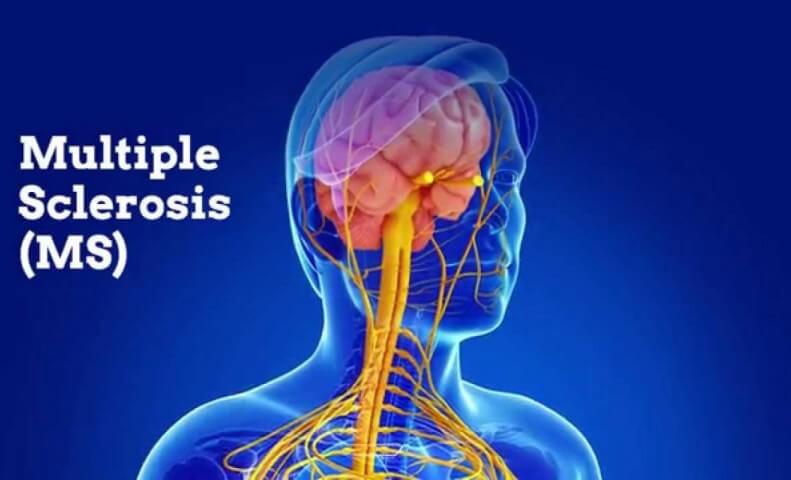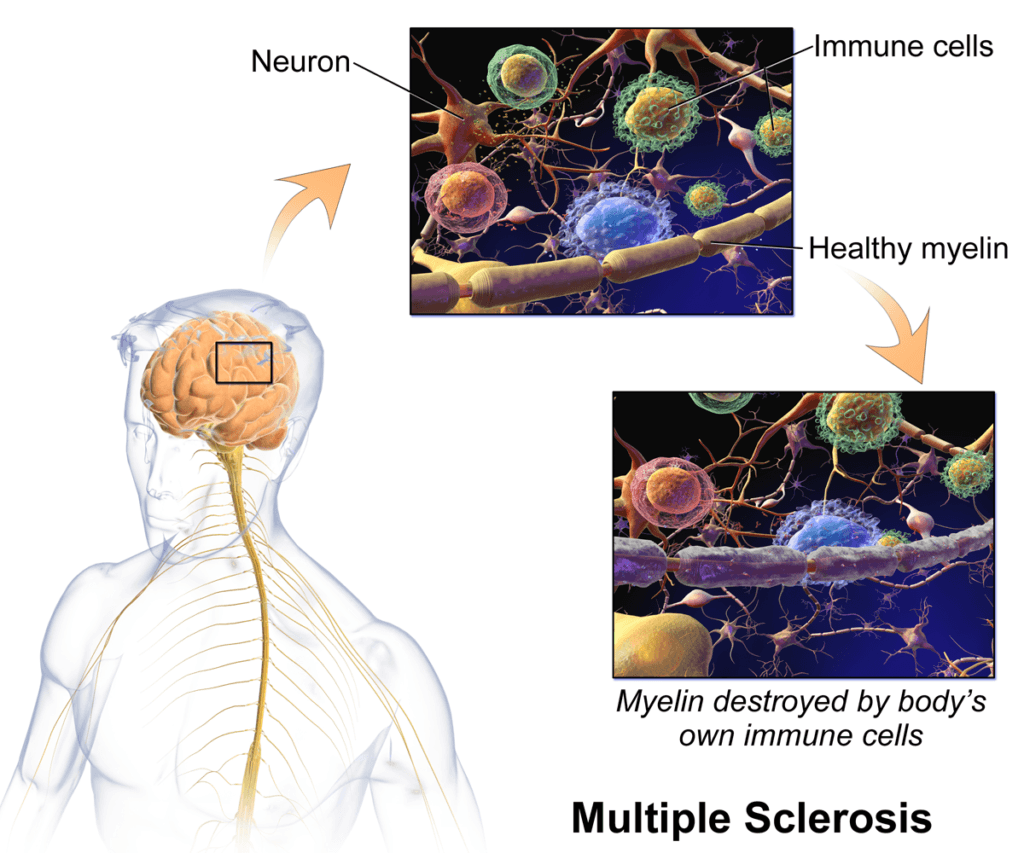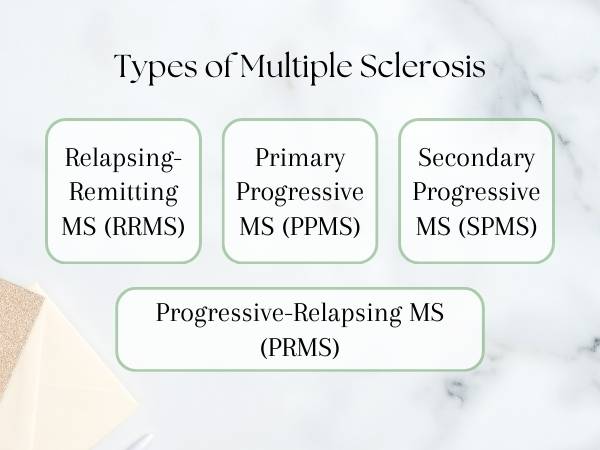- visual disturbances
- difficulties with coordination and balance
- numbness and tingling, as in "pins-and-needles"
- problems with thinking and memory
- muscle weakness

Multiple Sclerosis can lead to:
- Bladder problems: There may be difficulty emptying the bladder completely, frequent urination, and urge incontinence.
- Bowel problems: Constipation can lead to fecal impaction, and this can lead to bowel incontinence.
- Fatigue: This affects up to 90 percent of patients, and it can undermine their ability to function at work or at home.
- Dizziness and vertigo: These are common problems, along with difficulties with balance.
- Sexual dysfunction: A loss of interest in sex is common in both males and females.
- Spasticity and muscle spasms: Damaged nerve fibers in the spinal cord and brain can cause painful muscle spasms. Muscles might get stiff and be resistant to movement, known as spasticity.
- Tremor: There may be involuntary quivering movements.
- Vision problems: There may be double vision or blurring vision, a partial or total loss of vision, or red-green color distortion. This usually affects one eye at a time. Inflammation of the optic nerve can result in pain when the eye moves.
- Gait and mobility changes: MS can change the way people walk, because of muscle weakness and problems with balance, dizziness, and fatigue.
- Emotional changes and depression: Demyelination and nerve-fiber damage in the brain can trigger emotional changes, apart from the challenges of adjusting to the diagnosis of MS, an unpredictable, disabling disorder. Research has linked MS with a 50 percent chance of depression.
MS is difficult to diagnose since the symptoms can be indicative of many other conditions. A neurologist will look at your symptoms and medical history. Tests such as an MRI may be necessary to produce images that can show scarring of the myelin.
Ayurvedic view and treatment options :
Although there is no precise equivalent for Multiple Sclerosis in Ayurveda, MS can be considered a ‘VATA’ predominant disease. Vata is considered as a chief factor for the physiological maintenance of the body. Vata biofactor is responsible for functions of the central, autonomic, and peripheral nervous systems. Vata controls the respiratory, blood, lymphatic, excretory, and reproductive systems, as well as all types of movements. It is also responsible for the cognitive and neurocognitive function of the brain and the secretion of various chemical neurotransmitters and hormones. This description of Vata resembles the functions of central, peripheral, and autonomic nervous systems.
The Vata diseases as described in Ayurvedic classics include a wide range of neurological morbidities, including inflammatory, degenerative, obstructive, and functional. Factors provoking Vata result in the instantaneous manifestation of diseases, which can even prove to be fatal.
Most of the signs & symptoms of Muscle Neurone Disorders like fasciculations, cramps, wasting, weakness, spasticity, bulbar symptoms, etc. match that of the classical signs & symptoms of Vata derangement described in Ayurveda. So the line of treatment in Ayurveda mainly focuses on the pacification of Vata and bringing back the equilibrium between all the three Doshas (Vata, Pitta & Kapha).
Ayurvedic Pathophysiology of Multiple Sclerosis MS :
In Ayurveda, diseases are believed to occur, due to an imbalance of dosha. Pathology of MS involves two doshas – Pitta and Kapha. Pitta as the manager of heat in the body attacks the nerve sheaths (Majjadhatu) that are controlled by Kapha. This disease is usually classified as Kapha Roga because the dhatu under Kapha control is being damaged and ceases to function correctly.
Causes of this pathology are considered to be due to an excess of dosha accumulation mixed with ama or non-digested food. Different mixes of dosha and ama cause different manifestations of this disease. Any dosha can cause this pathology.
All forms of this condition reflect typical ama pathology. As ama accumulates in the body it migrates through the blood circulation (pitta & kapha in Rasa & Rakta dhatu / srotamsi) and is deposited in various locations of the body. Once ama is deposited in a dhatu it begins to attack the tissue or it provides an environment favorable for viral or bacterial growth. This sticky ama can also cause inflammation of the tissue that it is attached to – either with or without bacterial infection.
The Ayurvedic point of view that ama is the main causal factor behind auto-immune disorders cannot be forgotten or ignored. MS is classified as an auto-immune disease because the body’s immune system attacks and damages the myelin. This occurs because ama is attached to the nerve tissue and the immune response tries to remove it. This results in the immunity attacking the nerve tissue which has difficulty to separate from the ama that has attached to the myelin sheath.
Types Of MS according to Ayurveda :
1. Vataj - Samavata pathology causes dryness in Majjadhatu and this leads to inflammation (pitta) development as kapha is unable to lubricate and maintain correctly its dhatu. This form takes on the attributes of vata: irregularity, volatile, stress-activated, worse in the autumn and early winter, difficulties with coordination and balance, etc.
2. Pittaj - Samapitta pathology causes inflammation in Majjadhatu as it increases and invades the domain of Kapha. This form takes on the attributes of pitta: regularity, relapses, inflammation is more pronounced, affects pitta organs, worse in the spring and summer months, visual problems, etc.
3. Kaphaj - Samakapha pathology causes inflammation (pitta) to manifest due to its congestive nature. As Kapha prevents normal circulation of pitta, pitta increases and begins to attack the kapha tissue, Majjadhatu. This form takes on the attributes of kapha: regular, congestive, progressive, less inflammation, emotional symptoms of depression or unstable moods, worse in late winter and early spring, etc.
Ayurvedic line of treatment:

*Balancing the vata, and pitta, *strengthening Kapha, *correcting Agni (digestive system and cellular metabolism – Dhatwagni), *strengthening Ojus (Immune system).
Treatments: The treatment modalities include panchakarma, external therapies, internal medications, Activities, and Advice of food and lifestyle changes.
- Panchakarma – Virechana, Basti, Nasya
- Externally – Abhyanga, Udwarthana, Shiro Dhara, Kashaya Seka, SSPS, PPS, Chandana Avagha,
- Internally – Deepana – Carminative
- Pachana – Digestives
- Vatanulomana – Balancing vata
- Rasayana – Rejuvenators
Activities:
- Specific Asanas, Panayamas, meditation
- Physiotherapy, Aqua yoga.
Life Style Tips :
- Improving on the intake of water preferably warm water and foods which aid easy digestion.
- Timely regular wholesome meals in a conducible non-disturbing atmosphere
- Lifestyle changes: specific to the individual’s constitution, nature of work, and geographical conditions.
- Consume freshly prepared food and at normal intervals only.
- Avoid watching TV, talking, etc. while eating
- Avoid processed and fabricated food
- Avoid coffee, alcohol, tobacco, drugs, etc.
- Never take a shower immediately after food
- Drink a warm glass of water (this will stimulate the bowel movement)
Modern medical treatments for multiple sclerosis are based on immunosuppressive drugs and steroids. These treatments can only suppress the symptoms and slow the progress of the disease. In addition, they have severe side effects also in most cases. Ayurveda has effective treatments for multiple sclerosis which have shown considerable progress in many people with the disease.
As per Ayurveda, a healthy person is one who has all three doshas (Vata, Kapha, and Pitta) and 7 dhatus (plasma, blood, muscle, fat, bone, bone marrow and seminal fluid) in balance. Any imbalance will result in the person being unhealthy and prone to disease. Ayurveda further considers the immune system of the body as of primary importance and believes that the immune system is designed by nature to withstand all adversities and protect the body from harmful external and internal forces. Diseases typically occur due to improper lifestyle habits and abusing the body with harmful substances like alcohol, tobacco, and chemicals consumed as part of food.
Ayurveda views MS as primarily a vata disorder. The objective of Ayurvedic treatment for multiple sclerosis is to restore the immune system, especially the nervous system. The doctor would only decide on the treatment plan based on the examination of the patient in person. The treatment method could vary greatly based on the stage of the disease and also importantly the body constitution of the patient.
The long treatment duration is primarily because the body needs about 3 weeks to get used to the herbal medication and the real impact of the treatment will start only after those 3 weeks.
Actual treatment duration differs for each person and is typically dependent on the factors listed below :
- Constitution of the person (a person with a Vata constitution will need more time compared to someone with a Kapha constitution)
- Form of the disease (RRMS or Relapsing-Remitting Multiple Sclerosis, which is the most common form, takes comparatively less time than other forms of MS)
- Progress of the disease (people with initial symptoms and people with lesser number of lesions can be treated faster than others).
For expert opinion and your personalized treatment plan, please contact Doctors at Life Line Ayurvedic Herbal Clinic as soon as possible.



